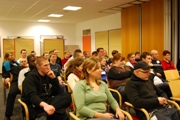Ver.di's European Youth Conference - The EU & you

EU & YOU
They have never been so close to the heart of the EU: 51 participants gathered at in Hessian Naumburg for the European conference of ver.di youth, 20-22 February 2009. The heart of the EU, the geographical centre, Gelnhausen lies only 100km south of here. Gelnhausen is the centre of the unions 27 member states since Bulgaria and Romania joined.
In order to shed some light on the jungle of the EU before the European elections in June, ver.di youth created a Europe-wide conference in the education centre of Naumburg. The predominant question was how trade unions can influence legislative processes within the EU and what impact these EU politics can and do have locally.
Arne Brix and Adriana Lettrari opened the workshop „EU for beginners“ with a knowledge test. Some of the young unionists knew more than others. The history of the EU is more than just the history of the European unification, the peaceful new beginning in countries marked by war and the east-European countries growing together. The history also entails the creation of the European domestic market, and the free moving of goods, services and people, as well as the liberalisation of the markets. Liberalisation and deregulation: one man’s meat is another man’s poison. “It was done professionally and with joined forces”, says Adriana, “but some of what we may criticise today, might have been neglected in those days, social integration for example.” Freedom reads positively: You can work anywhere. However, when a Frenchman decides to hire a floor tiler from Berlin this floor tiler works in France on German terms. “Subsequently we only have a minimum of social standards.”
„Liberalisation and deregulation at a European level are the result of the politics of national governments” says workshop leader Christian Woelm. In other words: the EU is no more than the sum of its members. Christian Woelm and Bernd Hampel led a workshop regarding liberalisation and deregulation in the EU. Is Europe there for the people or for the economy? Bernd Hampel has a clear answer: “Economic interests are ranked higher than the dignity of the people in Europe.”
Is it true that the people don’t relate to Europe? Or does Europe not relate to the people sometimes? Ver.di youth had invited one candidate from each of the five parties standing for the European elections represented in the German Bundestag, to which two came to this debate with young people that have taken an interest in the EU and the upcoming European elections.
„I didn’t realise how much power the EU exercises nowadays and how little one knows about it“, says one of the participants. For Martina Hartung, one of the organisers, the results of the weekend have an operational as well as a political dimension. “Ver.di youth is political. It is also able to look beyond its own nose, which often can’t be said about older workers’ councils’ members.”
It appears as though Europe moved a few kilometres closer to Naumburg that weekend.

